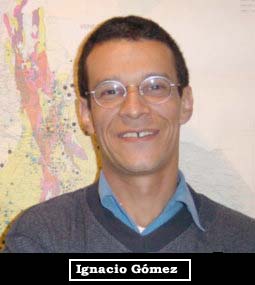Colombia: IGNACIO GÓMEZ
 Colombia is a country of terrible secrets, none of which are safe from Ignacio Gómez. In almost two decades as an investigative reporter, Gómez has exposed alliances between drug lords and politicians, foreign mercenaries operating in Colombia, corrupt soccer teams, and the role of the Colombian military and paramilitary forces in many notorious massacres. Colombia is a country of terrible secrets, none of which are safe from Ignacio Gómez. In almost two decades as an investigative reporter, Gómez has exposed alliances between drug lords and politicians, foreign mercenaries operating in Colombia, corrupt soccer teams, and the role of the Colombian military and paramilitary forces in many notorious massacres.
The 40-year-old Gómez, known to his friends as Nacho, got his start in journalism in 1986 as a reporter for the venerable Bogotá daily El Espectador. He remembers how honored he felt to meet the newspaper’s editor, Guillermo Cano. A few weeks later, Cano, who had crusaded against drug trafficking in Colombia, was killed on the orders of drug lord Pablo Escobar. The Cano murder deeply affected Gómez and inspired the twin passions of his career: Uncovering the truth regardless of the consequences and working to defend the rights of Colombian journalists confronting threats and danger. According to CPJ’s records, 29 Colombian journalists have been killed during the last decade, making Colombia one of the world’s most dangerous countries to practice journalism. In 1996, Gómez helped establish a Colombian press freedom organization, La Fundación para la Libertad de Prensa (FLIP), and served as its executive director until 2001. Gómez himself has been forced into exile twice–once in 1989 and again in 2000 after he published a report linking paramilitary leader Carlos Castaño to a 1997 massacre in the village of Mapiripán. A few months after that story was published, Gómez was nearly abducted while he was entering a taxi in Bogotá. The next day, Gómez’s colleague Jineth Bedoya was kidnapped and brutalized by men who told her they planned to cut Gómez into tiny pieces. Gómez spent a year in exile as a Neiman fellow at Harvard University and returned to Colombia last year to take on a new assignment as director of investigations for a public affairs television show called “Noticias Uno.” He quickly found himself in hot water after reporting on links between then-presidential candidate Alvaro Uribe Vélez and the Medellín drug cartel. After the report aired, Gómez, news director Daniel Coronell, and Coronell’s 3-year-old daughter received numerous death threats. An angry Uribe railed that “a free press is one thing, and a press at the service of … shady deals is something else.” In a country that has become increasingly inured to death, Gómez says he has fought hard not to succumb to cynicism. In 1989, after covering 36 separate massacres and viewing countless cadavers, Gómez was so distraught that the newspaper asked him to take some time off. “I had to learn to recover my sense of outrage,” he recalls. “It’s something I can never afford to lose.” END |